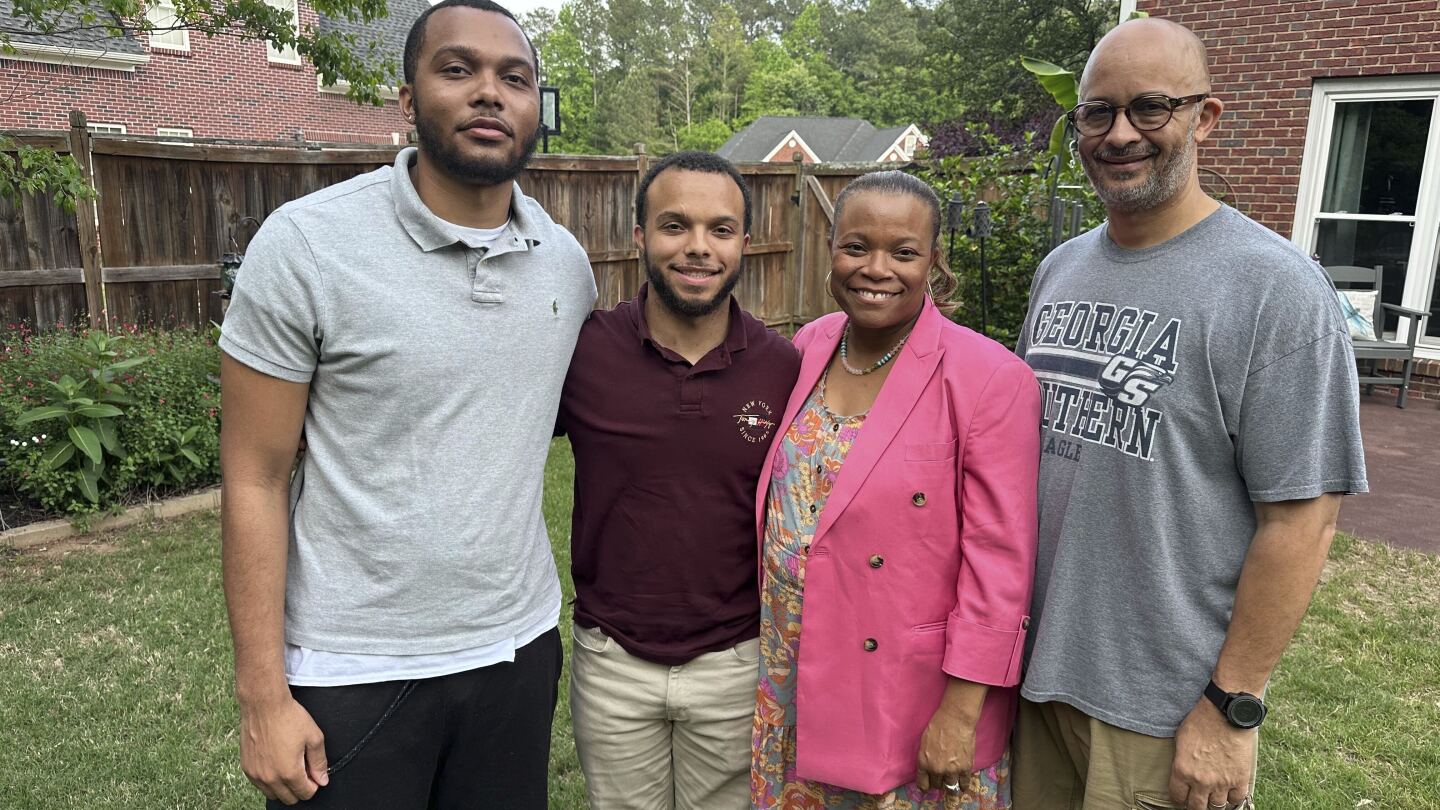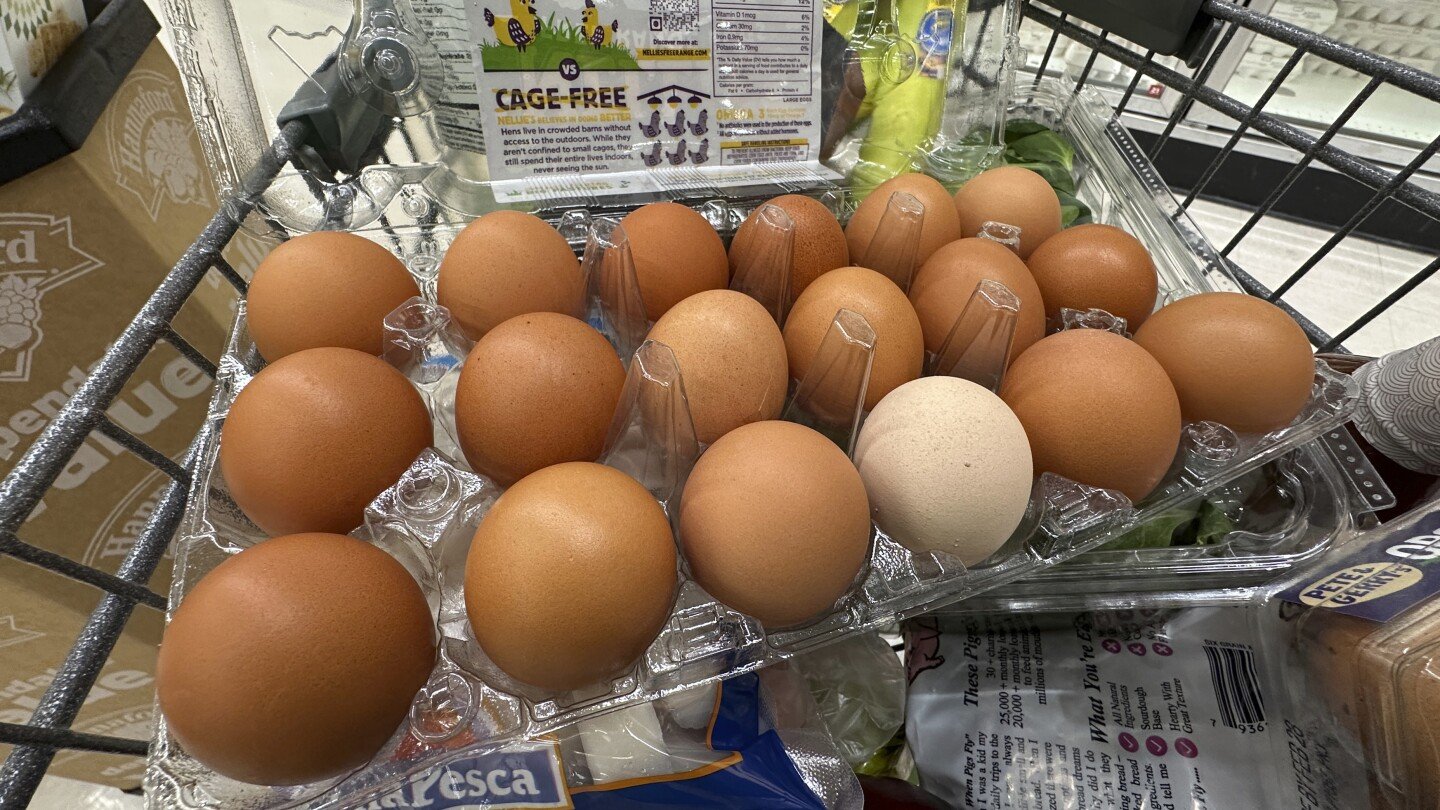Lifestyle
Accents are fading in parts of the US South, linguists say

Growing up in Atlanta in the 1940s and 1950s, Susan Levine’s visits to New York City relatives included being the star of an impromptu novelty show: Her cousin invited over friends and charged 25 cents a pop for them to listen to Levine’s Southern accent.
Even though they too grew up in Atlanta, Levine’s two sons, born more than a quarter century after her, never spoke with the accent that is perhaps the most famous regional dialect in the United States, with its elongated vowels and soft “r” sounds.
“My accent is nonexistent,” said Ira Levine, her oldest son. “People I work with, and even in school, people didn’t believe I was from Atlanta.”
The Southern accent, which has many variations, is fading in some areas of the South as people migrate to the region from other parts of the U.S. and around the world. A series of research papers published in December documented the diminishment of the regional accent among Black residents of the Atlanta area, white working-class people in the New Orleans area and people who grew up in Raleigh, North Carolina.
More than 5.8 million people have moved into the U.S. South so far in the 2020s, more than four times the combined total of the nation’s three other regions. Linguists don’t believe mass media has played a significant role in the language change, which tends to start in urban areas and radiate out to more rural places.
Late 20th century migration surge affects accents
The classical white Southern accent in the Atlanta area and other parts of the urban South peaked with baby boomers born between 1946 and 1964 and then dropped off with Gen Xers born between 1965 and 1980 and subsequent generations, in large part because of the tremendous in-migration of people in the second half of the 20th century.
It has been replaced among the youngest speakers in the 21st century with a dialect that was first noticed in California in the late 1980s, according to recent research from linguists at the University of Georgia, Georgia Tech and Brigham Young University. That dialect, which also was detected in Canada, has become a pan-regional accent as it has spread to other parts of the U.S., including Boston, New York and Michigan, contributing to the diminishment of their regional accents.
In Raleigh, North Carolina, the trigger point in the decline of the Southern accent was the opening in 1959 of the Research Triangle Park, a sprawling complex of research and technology firms that attracted tens of thousands of highly educated workers from outside the South. White residents born after 1979, a generation after the Research Triangle’s establishment, typically don’t talk with a Southern accent, linguist Sean Lundergan wrote in a paper published in December.
Often, outsiders wrongly associate a Southern accent with a lack of education, and some younger people may be trying to distance themselves from that stereotype.
“Young people today, especially the educated young people, they don’t want to sound too much like they are from a specific hometown,” said Georgia Tech linguist Lelia Glass, who co-wrote the Atlanta study. “They want to sound more kind of, nonlocal and geographically mobile.”
Accents change for younger people
The Southern dialect among Black people in Atlanta has dropped off in recent decades mainly because of an influx of African Americans from northern U.S. cities in what has been described as the “Reverse Great Migration.”
During the Great Migration, from roughly 1910 to 1970, African Americans from the South moved to cities in the North like New York, Detroit and Chicago. Their grandchildren and great-grandchildren have moved back South in large numbers to places like Atlanta during the late 20th and early 21st centuries and are more likely to be college-educated.
Researchers found Southern accents among African Americans dropped off with Gen Z, or those born between 1997 and 2012, according to a study published in December. The same researchers previously studied Southern accents among white people in Atlanta.
Michelle and Richard Beck, Gen Xers living in the Atlanta area, have Southern accents, but it’s missing in their two sons born in 1998 and 2001.
“I think they speak clearer than I do,” Richard Beck, a law enforcement officer, said of his sons. “They don’t sound as country as I do when it comes to the Southern drawl.”
New Orleans ‘yat’ accent diminished
Unlike other accents that have changed because of an influx of new residents, the distinctive, white working-class “yat” accent of New Orleans has declined as many locals left following the devastating Hurricane Katrina in 2005. The accent is distinct from other regional accents in the South and often described as sounding as much like Brooklynese as Southern.
The hurricane was a “catastrophic” language change event for New Orleans since it displaced around a quarter million residents in the first year after the storm and brought in tens of thousands of outsiders in the following decade.
The diminishment of the “yat” accent is most noticeable in millennials, who were adolescents when Katrina hit, since they were exposed to other ways of speaking during a key time for linguistic development, Virginia Tech sociolinguist Katie Carmichael said in a paper published in December.
Cheryl Wilson Lanier, a 64-year-old who grew up in Chalmette, Louisiana, one of the New Orleans suburbs where the accent was most prevalent, worries that part of the region’s uniqueness will be lost if the accent disappears.
“It’s kind of like we’re losing our distinct personality,” she said.
Southern identity changing
While it is diminishing in many urban areas, the Southern accent is unlikely to disappear completely because “accents are an incredibly straightforward way of showing other people something about ourselves,” said University of Georgia linguist Margaret Renwick, one of the authors of the Atlanta studies.
It may instead reflect a change in how younger speakers view Southern identity, with a regional accent not as closely associated with what is considered Southern as in previous generations, and linguistic boundaries less important than other factors, she said.
“So young people in the Atlanta area or Raleigh area have a different vision of what life is in the South,” Renwick said. “And it’s not the same as the one that their parents or grandparents grew up with.”
___
Follow Mike Schneider on the social platform Bluesky: @mikeysid.bsky.social.
Lifestyle
Cooling gadgets and wearables can help you beat the heat

You can only sit in front of the fridge with the door open for so long.
As heat waves blast the world like a blow dryer on high, folks are reaching for anything that promises a little personal chill: portable mini fans, cooling neck wraps, high-tech vests and all kinds of heat-beating headwear.
Of course, cooling gear helps most when paired with basic and safe strategies against the heat: most importantly hydration, shade and rest. Stay out of extreme heat when possible, and know the signs of heat exhaustion or heat stroke.
Yet these wearable wonders and breezy gadgets can offer some relief. They might look quirky, but when the AC struggles and the sidewalk feels like a stovetop, they can start to seem like must-haves.
When you’re at home
Indoors, stay comfy with cool-feel sheets (like those with a silky finish or lightweight fibers), bed fans (where a nozzle inserted into the bed linens pumps a flow of air around you), or a cooling pillow or chill pad, which are filled with a gel that can stay cool for hours. Sleep-product brands include Serta, Sealy, Casper, Pluto and Threshold.
The chill pads can work for your own bed and the pets’ bed too. There are chillable full-size mattresses (Chilipad, 8Sleep and BedJet get good reviews from The Spruce) and smaller, simple pads (CoolCare and Sharper Image, among others).
Outdoor wearables
Clare Epstein, an employee safety expert with Vector Solutions in Tampa, Florida, works to reduce heat stress for at-risk employees in industries like construction, aviation and agriculture. She recommends wearables like cooling scarves and evaporative cooling vests.
“By soaking the fabric in cold water at the beginning of the day, the vest slowly cools, and keeps the wearer cool,” she says.
Clothes made of “phase change materials,” or PCMs, contain gel capsules or pads that can help moderate body temperatures. Uline.com advertises a vest that stays under 60 degrees for a few hours, and AlphaCool offers a neck tube that performs similarly. Another feature of the tube, which is made of a polymer material, is that it doesn’t get overly chilled, so it’s safe for kids to use.
Also for kids, there’s a line of plush toys from Warmies that includes little critters of the farmyard, ocean, forest and safari that can be popped in the freezer before a trip to the park or playground.
Wearable items that incorporate small fans or thermoelectric coolers are also good, Epstein says. And there are vests with tubed reservoirs you can fill with water or electrolytes so you can sip as you go.
“These encourage people to take more water breaks, and stay hydrated,” says Epstein.
The wearables range is extensive. Along with cooling buffs, headbands, wristbands, socks and scarves, there are cooling brimmed hats and ball caps. Brands include Mission, Ergodyne, and Sunday Afternoon.
If you’d prefer a refreshing breeze, USB-chargeable handheld or wearable fans might do the job.
Chill advice
Lynn Campbell, co-founder of 10Adventures travel company in Calgary, Alberta, takes a lot of strenuous hiking and cycling trips with her husband, Richard. They’ve developed some easy hacks for hot days.
“We’ll wake up early, so we’re done by 10 or 11 a.m., or if we’re out on the trails, split the day in two, so we rest by water or in the shade over the hottest part” of the day, she says.
Wear light colors and thin, breathable fabrics.
And bring an umbrella. “This is a game-changer,” Campbell says. “Now we always pack ultralight, compact ones; they’re incredible.”
Also, pour cool water on your head and back. “We freeze a few bottles of water so we can pour ice water on us to cool down,” Campbell says. “Putting the bottles under the armpits, in the groin, or on the back of the neck can effectively cool a person down.”
And Annita Katee, a contributing writer for Apartment Therapy, has another way to prep your bed on hot nights:
“Pop your sheets into the freezer at least two hours before bedtime, then pull them out right before you hit the sack,” she wrote in a recent post. She folds hers into a zipped plastic bag, flattens it, then sets it on a freezer shelf between ice packs.
“The result? A delightfully cool bed that feels like a refreshing oasis against the heat.”
___
New York-based writer Kim Cook covers design and decor topics regularly for The AP. Follow her on Instagram at @kimcookhome.
For more AP Lifestyles stories, go to https://apnews.com/lifestyle
Lifestyle
Americans buying less cereal may be a factor in sale of Kellogg’s brands

Breakfast cereal could use a lucky charm.
U.S. sales of the colorfully packaged morning staple have been in a decades-long decline, a trend back in the spotlight with news that Italian confectioner Ferrero Group plans to purchase WK Kellogg, maker of Corn Flakes, Froot Loops, Rice Krispies and other familiar brands.
Except for a brief period during the coronavirus pandemic, when many workers were home and had time to sit down with a bowl of cereal and milk, sales of cold cereal have steadily fallen for at least 25 years, experts say.
In the 52 weeks ending July 3, 2021, Americans bought nearly 2.5 billion boxes of cereal, according to market research company Nielsen IQ. In the same period this year, the number was down more than 13% to 2.1 billion.
Cereal has been struggling for multiple reasons. The rise of more portable options like Nutri-Grain bars and Clif Bars – which both went on sale in the early 1990s – made it easier for consumers to grab breakfast on the go.
Concerns about food processing and sugar intake have also dimmed some consumers’ enthusiasm for cereals. One cup of Lucky Charms contains 24% of a consumer’s daily recommended intake of sugar, for example.
“Cereal finds it really hard to get out from underneath that,” said Tom Rees, global insight manager for staple foods at the consulting company Euromonitor. “It can’t escape the fact that it doesn’t look like a natural food. You have to create it and form it.”
Rees noted that for decades, cereal manufacturers focused on adding vitamins and minerals to build cereal’s health credentials. But consumers now are looking for simplified ingredient lists.
Artificial dyes — like the petroleum-based colors that brighten Froot Loops — have also come under fire. Last fall, dozens of people rallied outside WK Kellogg’s Battle Creek, Michigan, headquarters demanding that it remove artificial dyes from its cereals. Kellogg and General Mills — another major U.S. cereal maker — have since pledged to phase out artificial dyes.
Add to that, consumers are expanding their idea of what breakfast can be. Yogurt and shakes have replaced the traditional bacon and eggs. Kenton Barello, a vice president at the market research firm YouGov, said his polling shows that Generation Z consumers, who were born between 1997 and 2007, eat more vegetables for breakfast than other generations.
Barello said YouGov’s polling also shows that members of Gen Z are less likely to eat breakfast but still buy ready-to-eat cereal, suggesting they’re eating it as a snack or for other meals.
“With younger generations, there are differences in their relationship with food and these eating moments,” Barello said. “They are going about breakfast in a different way than Millennials, Gen X and Baby Boomers.”
Cereal’s struggles are part of what led to the breakup of the Kellogg Company. In 2023, the century-old company that put Battle Creek, Michigan, on the map split into two companies. Kellanova took popular snack brands like Cheez-Its, Pringles and Pop-Tarts as well as international cereals, and WK Kellogg made cereals for the U.S., Canada and the Caribbean.
In 2024, M&M’s maker Mars Inc. announced a plan to buy Kellanova for more than $30 billion. That plan has cleared U.S. regulators but is still awaiting regulatory approval in Europe. WK Kellogg was left to try to rejuvenate the cereal business.
The sale of WK Kellogg to Ferrero doesn’t mean supermarket cereal aisles are at risk of extinction. Packaged food companies have options for turning around their soggy cereal sales, Rees said. He thinks Kellogg’s Mashups line, which mixed brands like Frosted Flakes and Froot Loops into one box, appeal to younger consumers, who tend to like interesting flavor combinations.
The market may also have a fragmented future, according to Rees. Companies may have to accept that younger buyers want a sweet-and-spicy cereal while older buyers might want a Keto-friendly option.
“The future might be realizing that the era of ‘This brand will serve everybody’ isn’t going to happen,” Rees said.
Julia Mills, a food analyst with the consulting company Mintel, thinks the shrinking population of children in the U.S. gives cereal makers the opportunity to shift to more sophisticated flavors and packaging. Cereal could be positioned as a fancy topping for yogurt, for example, or a fiber-rich food that can improve gut health.
Some niche cereal brands, like high-fiber Poop Like a Champion cereal and high-protein, zero-sugar Magic Spoon, are already doing that. But legacy brands say they shouldn’t be counted out.
Jeffrey Harmening, the chairman and chief executive officer of Cheerios maker General Mills, said his company considered trying to acquire Magic Spoon. Instead, it made high-protein versions of Cheerios, which now outsells Magic Spoon.
“The key to longer term is, honestly, is giving consumers more of what they want,” Harmening said during a conference call with investors in March.
Lifestyle
Trump administration sues California over egg prices and blames animal welfare laws

The Trump administration is suing the state of California to block animal welfare laws that it says unconstitutionally helped send egg prices soaring. But a group that spearheaded the requirements pushed back, blaming bird flu for the hit to consumers’ pocketbooks.
The lawsuit, filed in federal court in California on Wednesday, challenges voter initiatives that passed in 2018 and 2008. They require that all eggs sold in California come from cage-free hens.
The Trump administration says the law imposes burdensome red tape on the production of eggs and egg products across the country because of the state’s outsize role in the national economy.
“It is one thing if California passes laws that affects its own State, it is another when those laws affect other States in violation of the U.S. Constitution,” U.S. Agriculture Brooke Rollins said in a statement Thursday. “Thankfully, President Trump is standing up against this overreach.”
Egg prices soared last year and earlier this year due in large part to bird flu, which has forced producers to destroy nearly 175 million birds since early 2022. But prices have come down sharply recently. While the Trump administration claims credit for that, seasonal factors are also important. Avian influenza, which is spread by wild birds, tends to spike during the spring and fall migrations and drop in summer.
“Pointing fingers won’t change the fact that it is the President’s economic policies that have been destructive,” the California Department of Justice said in a statement Friday. “We’ll see him in court.”
The average national price for a dozen Grade A eggs declined to $5.12 in April and $4.55 in May after reaching a record $6.23 in March, according to the U.S. Bureau of Labor Statistics. But the May price was still 68.5% higher than a year earlier.
“Trump’s back to his favorite hobby: blaming California for literally everything,” Gov. Gavin Newsom’s office said in a social media post.
The federal complaint alleges that California contributed to the rise in egg prices with regulations that forced farmers across the country to adopt more expensive production practices. The lawsuit also asserts that it is the federal government’s legal prerogative to regulate egg production. So it seeks to permanently block enforcement of the California regulations that flowed from the two ballot measures.
“Americans across the country have suffered the consequences of liberal policies causing massive inflation for everyday items like eggs,” Attorney General Pam Bondi said in a statement. “Under President Trump’s leadership, we will use the full extent of federal law to ensure that American families are free from oppressive regulatory burdens and restore American prosperity.”
While 2018’s Proposition 12 also banned the sale of pork and veal in California from animals raised in cages that don’t meet minimum size requirements, the lawsuit only focuses on the state’s egg rules.
Humane World for Animals, which was named the Humane Society of the United States when it spearheaded the passage of Proposition 12, says avian influenza and other factors drove up egg prices, not animal welfare laws. And it says much of the U.S. egg industry went cage-free anyway because of demand from consumers who don’t want eggs from hens confined to tiny spaces.
“California has prohibited the sale of cruelly produced eggs for more than a decade — law that has been upheld by courts at every level, including the Supreme Court. Blaming 2025 egg prices on these established animal welfare standards shows that this case is about pure politics, not constitutional law,” Sara Amundson, president of the Humane World Action Fund, said in a statement.
The American Egg Board, which represents the industry, said Friday that it will monitor the progress of the lawsuit while continuing to comply with California’s laws, and that it appreciates Rollins’ efforts to support farmers in their fight against bird flu and to stabilize the egg supply.
“Egg farmers have been both responsive and responsible in meeting changing demand for cage-free eggs, while supporting all types of egg production, and continuing to provide options in the egg case for consumers,” the board said in a statement.
-

 Sports4 days ago
Sports4 days agoThe behind-the-scenes story of a WNBA controversy: Caitlin Clark, DiJonai Carrington and a journalist’s questions
-

 Europe3 days ago
Europe3 days agoTrump promised 200 deals by now. He’s gotten 3, and 1 more is getting very close
-

 Sports4 days ago
Sports4 days ago‘Keep pumping’: The new dance inspiring Novak Djokovic’s quest for a record-equaling Wimbledon title
-

 Sports4 days ago
Sports4 days agoTyrese Haliburton to miss entire 2025-26 NBA season to rehab torn Achilles tendon
-

 Europe3 days ago
Europe3 days agoExtreme heat is a killer. A recent heat wave shows how much more deadly its becoming as humans warm the world
-

 Africa4 days ago
Africa4 days agoCairo telecom fire injures 14, disrupts internet nationwide
-

 Europe4 days ago
Europe4 days agoHe was born to a US citizen soldier on an army base in Germany. Now he’s been deported to Jamaica, a country he’d never been to
-

 Africa5 days ago
Africa5 days agoMore than 1,200 migrants arrive in Crete amid influx from Libya




